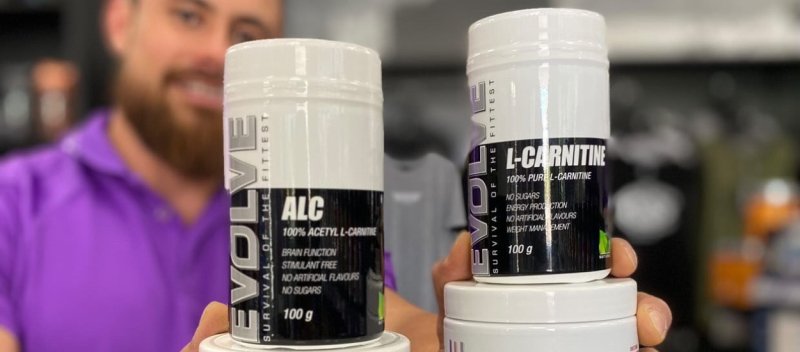
ACETYL L-CARNITINE VS L-CARNITINE EXPLAINED
|
|
Time to read 3 min
|
|
Time to read 3 min
You’ve probably notice the name ‘ Carnitine ’ floating around and you’re probably wondering what it is, what it does and what one is the better option for you? Don’t you worry, we’re here to break it down for you.
Carnitine is a naturally derived nutrient sourced from amino acids and synthesised inside the liver, kidney and brain from the specific amino acids Methionine and Lysine. Carnitine can be present in foods, especially animal based products and or can be found as a dietary supplement including “thermogenics” . So, you may find Carnitine in three main forms, L-Carnitine, Acetyl-L-Carnitine and Propionyl-L-Carnitine (National Institutes of Health, 2023).
L-Carnitine is the Isomer form of Carnitine, which means it is the same chemical formula but the pieces are arranged differently. L-Carnitine supports the movement of fatty acids to the cells (mitochondria) to be burnt for energy (Ferreira and McKenna, 2017). As L-Carnitine is an ‘isomer’ it can be found in red meat and dairy products but additionally in the form of “thermogenic” supplements”.
L-Carnitine has many benefits, its crucial for energy production as its an essential cofactor for the transport of long-chain fatty acids into our cells (Mitochondria) to produce Adenosine Triphosphate (ATP) which is responsible for energy production. In addition to this L-Carnitine is being researched for its potential health benefits in Alzheimers disease, dementia, Cardiovascular disease, peripheral artery disease, insulin resistance, diabetes, infertility, oesteoarthritis, athletic performance and weight loss (National Institutes of Health, 2023).
There is a wide variety of L-Carnitine supplements available, check out a few from our range below or shop our online range of L-Carnitine supplements.
Acetyl L-Carnitine (ALC) is the acetylated version of L-Carnitine, meaning it has an acetyl group attached to the chemical structure. Because of its chemical composition, ALC is able to cross the blood brain barrier in which supports cognitive function. Alike L-Carnitine ALC also supports metabolism and hence is a popular supplement for nootropic and metabolism benefits.
Acetyl-L-Carnitine is versatile, because of ALC’s ability to cross the blood brain barrier it supports brain energy, focus, supports healthy mood and may improves memory health. Similar to L-Carnitine ALC aids in converting fat for energy, which can be beneficial for physical performance and metabolism.
Much like L-Carnitine, ALC supplements are readily available. Shop some of our favourites below or shop Acetyl L-Carnitine supplements online.
Understanding the difference between L-Carnitine and ALC is a key factor for optimising your health regimen. These derivatives of the amino acid Carnitine differ in their chemical structures, resulting in unique benefits and applications.
L-Carnitine, closely resembling the base structure of Carnitine, excels in metabolic functions. It facilitates the transport of long-chain fatty acids into mitochondria, enhancing energy production and supporting overall metabolism (National Institutes of Health, 2023). Conversely, ALC boasts an added acetyl group that enables it to cross the blood-brain barrier. This attribute makes ALC particularly effective for cognitive enhancement and neuroprotection. While both forms provide metabolic benefits, ALC's superior ability to improve mental clarity and focus distinguishes it as a powerful nootropic (WebMD, 2021).
ALC generally has higher bioavailability due to its acetyl group, making it more efficiently absorbed and utilised by the body compared to L-Carnitine.
Both forms are available as dietary supplements. L-Carnitine can also be found in red meat and dairy products, while ALC supplements are typically preferred for targeting brain health.
If you're struggling to determine which is better suited for you, you may like to check out a supplement blend of ALC and L-Carnitine.
Currently, there is no established Upper Limit to how much Carnitine you can consume per day. However, our body requires around 15mg/day from both food sources and internal creation (National Institutes of Health, 2023).
In terms of supplementation, research has found that more than 3g of Carnitine supplements per day may induce side effects such as nausea, vomiting, abdominal cramps and or diahrrohea (National Institutes of Health, 2023).
Alternatively, if you are currently taking any medication and plan on starting a Carnitine supplement or if you are unsure, please consult a health care professional such as a General Practitioner.
In summary, while both L-carnitine and ALC offer distinct benefits, L-carnitine is generally best suited for those looking to enhance physical performance and energy production, whereas ALC is advantageous for individuals seeking cognitive support and neuroprotection.
If you need more help deciphering the difference between L-Carnitine and Acetyl L-Carnitine or want to make sure these supplements are right for you, we are here to help. Discover our educational blogs on “ The best thermogenic supplements for weight management” or “Kickstart your weightloss plan” .
Alternatively, reach out online or head in-store across, and our friendly ASN team can help you choose the best products to support your individual needs.
National Institutes of Health. (2023). Carnitine. Retrieved from https://ods.od.nih.gov/factsheets/Carnitine-HealthProfessional/
WebMD. (2021). Acetyl-L-Carnitine. Retrieved from https://www.webmd.com/vitamins/ai/ingredientmono-834/acetyl-l-carnitine
Ferreira, G.C. and McKenna, M.C. (2017). l-Carnitine and Acetyl-l-carnitine Roles and Neuroprotection in Developing Brain. Neurochemical Research, 42(6), pp.1661–1675. doi: https://doi.org/10.1007/s11064-017-2288-7 .